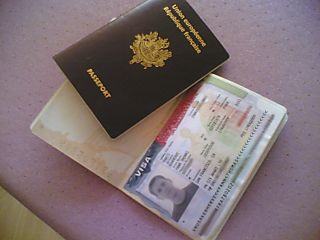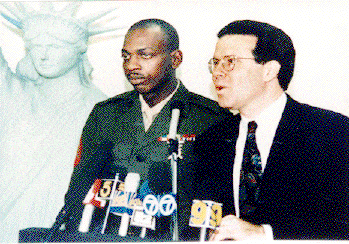 The B-2 visa is for persons desiring to enter the United States for pleasure or medical treatment. The B-1 visa is for business visitors.
The B-2 visa is for persons desiring to enter the United States for pleasure or medical treatment. The B-1 visa is for business visitors.
On August 5, 2025, the U.S. Department of State announced that persons from particular countries seeking visitor visas to enter the United States will have to pay bonds in the amount of $5,000 to $15,000.
Generally, a citizen of a foreign country who wishes to enter the United States must first obtain a visa, either a nonimmigrant visa for temporary stay, or an immigrant visa for permanent residence.
Persons from countries where few people tend not to overstay their visitors visas are eligible to visit the U.S. for up to 90 days without having to apply for a B-2 visa. This is known as the Visa Waiver Program. Such persons are required to complete the Electronic System for Travel Authorization (ESTA) online before traveling to the U.S.
Client Reviews

Know Their Job Well And Perform It Flawlessly
“Don’t do the mistake we did and try to save few bucks going with nonprofessionals and sole practitioners! It will end up not only costing you much more in the long run, but also putting your status in jeopardy which can have a priceless impact. It is one of the most important steps in your life.”
- Sgt. Danny Lightfoot, Los Angeles, California
Read More Reviews
Zoom Consultations Available!
B Visa – General Resources
- B-2 Visitor Visa to the U.S. (State Department)
- Domestic Partners Of Nonimmigrants
- B-1 Temporary Business Visa (USCIS)
- Special Instructions for B-1/B-2 Visitors Who Want to Enroll in School (USCIS)
- Honorarium Payments to Foreign Nationals
Visa Waiver Program
- Visa Waiver Program (State Department)
- Visa Waiver Program (CBP)
- Electronic System for Travel Authorization (ESTA)
- Visa Waiver Program Report (Congressional Research Service)
QUALIFYING FOR A VISITORS VISA
Applicants for visitor visas must show that they qualify under provisions of the Immigration and Nationality Act. The presumption in the law is that every visa applicant is an intending immigrant. Therefore, applicants for visitor visas must overcome this presumption by demonstrating that:
The purpose of their trip is to enter the U.S. for business, pleasure, or medical treatment; That they plan to remain for a specific, limited period; and that they have a residence outside the U.S. as well as other binding ties which will insure their return abroad at the end of the visit.
VISA INELIGIBILITY/ WAIVER
The nonimmigrant visa application Form DS-160 lists classes of persons who are ineligible under U.S. law to receive visas. In some instances an applicant who is ineligible, but who is otherwise properly classifiable as a visitor, may apply for a waiver of ineligibility and be issued a visa if the waiver is approved.
APPLYING FOR A B VISA
Applicants for visitor visas should generally apply at the American Embassy or Consulate with jurisdiction over their place of permanent residence. Although visa applicants may apply at any U.S. consular office abroad, it may be more difficult to qualify for the visa outside the country of permanent residence.
B-2 Visa – Required Documentation
Each applicant for a visitor visa must submit: 1) An application Form DS-160, completed and signed;
2) A passport valid for travel to the United States and with a validity date at least six months beyond the applicant’s intended period of stay in the United States. If more than one person is included in the passport, each person desiring a visa must make an application;
3) One photograph 1 and 1/2 inches square (37×37 mm) for each applicant aged 16 and older, showing full face, without head covering, against a light background.
B Visa – Optional Documentation
Applicants must demonstrate that they are properly classifiable as visitors under U.S. law. Evidence which shows the purpose of the trip, intent to depart the United States, and arrangements made to cover the costs of the trip may be provided. It is impossible to specify the exact form the evidence should take since applicants’ circumstances vary greatly.
Persons traveling to the U.S. on business can present a letter from the U.S. business firm indicating the purpose of the trip, the bearer’s intended length of stay, and the firm’s intent to defray travel costs. Persons traveling to the U.S. for pleasure may use letters from relatives or friends in the U.S. whom the applicant plans to visit, or confirmation of participation in a planned tour.
Persons traveling to the U.S. for medical treatment should have a statement from a doctor or institution concerning proposed medical treatment.
Those applicants who do not have sufficient funds to support themselves while in the U.S. must present convincing evidence that an interested person will provide support. Visitors are not permitted to accept employment during their stay in the U.S.
Depending on individual circumstances, applicants may provide other evidence substantiating the trip’s purpose and specifying the nature of binding obligations, such as family ties or employment, which would compel their return abroad.
B-2 VISA – ADDITIONAL INFORMATION
A person whose passport contains a previously issued visitor visa should inquire about special expedited procedures available at most consular offices for issuance of a new visitor visa.
Unless previously canceled, a B-2 visa is valid until its expiration date. Therefore, if the traveler has a valid B-2 visa in an expired passport, he or she may use it along with a new valid passport for travel and admission to the United States.
A non-refundable application fee is collected at posts which issue machine-readable visas. If there is a fee for issuance of the visa, it is equal as nearly as possible to the fee charged to United States citizens by the applicant’s country of nationality.
Applicants for visitor visas should not find it necessary to employ persons to assist them in preparing documents or securing access to the U.S. consular office.
Attempting to obtain a visa by the willful misrepresentation of a material fact, or fraud, may result in the permanent refusal of a visa or denial of entry into the United States.
If the consular officer should find it necessary to deny the issuance of a B-2 visa, the applicant may apply again if there is new evidence to overcome the basis for the refusal. In the absence of new evidence, consular officers are not obliged to re-examine such cases.
U.S. PORT OF ENTRY
Applicants should be aware that a B-2 visa does not guarantee entry into the United States. The U.S. Citizenship and Immigration Service (USCIS) has authority to deny admission. Also, the period for which the bearer of a visitor visa is authorized to remain in the United States is determined by the USCIS, not the consular officer. At the port of entry, an USCIS official must authorize the traveler’s admission to the U.S.
At that time the USCIS Form I-94, Record of Arrival-Departure, which notes the length of stay permitted, is validated. Those visitors who wish to stay beyond the time indicated on their Form I-94 must contact the USCIS to request Form I-539, Application to Extend Status. The decision to grant or deny a request for extension of stay is made solely by the USCIS.








